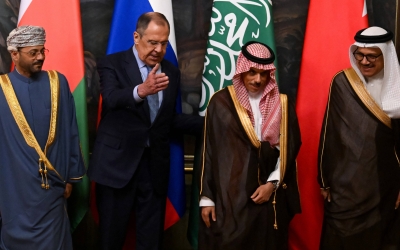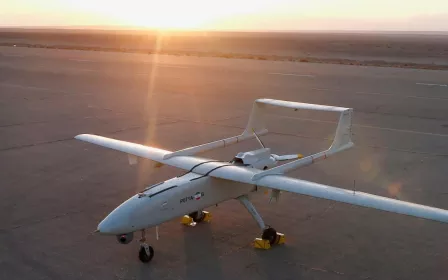Why Iran and Russia are openly disagreeing in the Middle East

Despite Iran's official membership of the Shanghai Cooperation Organisation, its full support for the Russian government during the Wagner Group rebellion and its continued support during the Ukraine war, the Russian foreign ministry preferred to endorse the United Arab Emirates' claims concerning the three islands Tehran claims are Iranian near the Strait of Hormuz.
Taking a routine diplomatic step, the Iranian foreign ministry summoned the Russian ambassador to protest against the challenge to its ownership over the islands. It asked Russia to "correct its position" on the issue.
Iran's ambassador to Russia met with the Russian presidential envoy for the Middle East and deputy foreign minister in Moscow, and the official Russian news agency TASS reported the discussion as simply a small part of broader "Middle East problems".
Russia remained firm in its position and also used the term "Gulf" instead of the Iranian term "Persian Gulf" in its diplomatic narratives.
Instead of signalling strength, Russia's behaviour revealed a weakness in its relationship with the West, Iran and Arab nations.
Stay informed with MEE's newsletters
Sign up to get the latest alerts, insights and analysis, starting with Turkey Unpacked
As of now, Russia has failed to accomplish its goals in Ukraine and has been unable to halt Nato's expansion. As well as supporting Sweden's Nato membership, Turkey has also declared its support for Ukraine's membership. Ukraine still receives comprehensive support from the West with no immediate prospects of concessions to Moscow for peace.
While Iran continues to support Russia through military, political and diplomatic means, Moscow fears that Tehran will use this support as a bargaining chip in the negotiations to revive its nuclear talks, formally known as the Joint Comprehensive Plan of Action (JCPOA), with the United States and Europe.
A recently reached "informal and unwritten agreement" between the US and Iran, which has already started to be implemented, appears to have raised Russian concerns. Iran has pledged to not only “expand its cooperation with international nuclear inspectors” but also to “refrain from selling ballistic missiles to Russia” and to “stop lethal attacks on American contractors in Syria and Iraq”.
As Iran's primary security partner and a party to the JCPOA, Russia interpreted the latter provisions entirely with suspicion.
Fragile and weak
Iran officials' backlash against Russia is much greater than the reaction to the Chinese government's similar stance towards the Iranian islands, indicating that Tehran views Russia as fragile and weak, and does not feel it is capable of using the Iranian-Arab tensions as leverage against Iran because it lacked adequate diplomatic, political and economic power.
As for Russia's latest stance, Iran's support for Russia is conditional, according to the head of the Iranian parliament's National Security and Foreign Policy Commission.
A senior commander in the Islamic Revolutionary Guard Corps, Mohsen Rezaei, announced that Iran's relations with Russia did not stem from weakness and that Russia should correct its position.
Ali Akbar Velayati, the adviser to Iran's supreme leader on international affairs, found it "naive".
It was surprising to find that high-profile conservative politicians such as Mohammad-Javad Larijani and Mohammad Bagher Ghalibaf blamed Russia for opportunistically "playing in the American game" and "helping the West in destabilising the Persian Gulf".
Therefore, the high political and diplomatic costs of supporting Russia in the Ukraine conflict may have caused Iran to reconsider its Ukraine policy.
I learned from an informed source in Tehran that Iran wants to revise its position in Ukraine. Based on senior Iranian officials' reactions, it is evident that Russia has lost its power and strength for a substantial role in international and bilateral economic and security equations.
While Russia's overreliance on military threats and actions failed to achieve the desired results, Nato expansion continued, as more republics in the South Caucasus and Central Asia became more open to EU and US influence and complied with western pressures on Russia.
In consequence, unlimited support for Russia's Ukraine invasion could exacerbate Iran's vital interests, as well as increase the likelihood of unexpected western legal, political, security and military "plots" against Tehran.
'Unfounded allegations'
Interestingly, Iran's supreme leader said in his latest speech that the people of Ukraine were "poor" and "helpless", showing that he did not consider Russia's performance and the consequences of the war in Ukraine to be positive.
The Iranian embassy in Brussels issued a statement immediately rejecting the "unfounded allegations made against Iran in a summit communique issued by Nato heads of state" regarding "Iran's involvement in the Ukrainian situation".
The statement reaffirmed that Iran “as a responsible and influential regional actor, consistently emphasises the importance of full adherence to the purposes and principles of the United Nations Charter and relevant international law”, which “includes respecting the sovereignty, independence and territorial integrity of all states”.
Moreover, Iran's de-escalation and normalisation of relations with Arab Gulf states, which was carried out via China's mediation, resulted in a diplomatic failure for Russia. Prior to China's diplomatic initiative, Russia sought to position itself as a great diplomatic power in managing tensions in the Middle East by proposing the "concept of collective security in the Persian Gulf".
Russia is not pleased with Iran normalising diplomatic relations with regional Arab countries, according to Shahryar Heydari, the vice chairman of the Iranian parliament's National Security and Foreign Policy Commission.
"In light of the declining role of the West in the region, Russia, which is engaged in a war with Ukraine, strives to amplify its involvement. Iran's naval power is causing concern among trans-regional countries, despite the fact that our power and authority will expand over regional waters. Therefore, Russia seeks to enhance its role in the region by undermining our regional links," Heydari explained.
Russia no longer plays a significant role in Iran's indirect nuclear talks with the US and European countries, and China dominates the de-escalation process between Iran and Arab countries.
Nevertheless, based on the GCC-Russia joint statement, Arab countries perceive Moscow as an important source to reign in Iran's regional behaviour. Also, Russia's diplomatic and political weight could deter Tehran from embarking on a new escalation in the region. Prior to discussing the islands, the statement focused on preserving maritime security and waterways in the region, as well as threats to shipping lines, international trade, and oil installations.
From this standpoint, Tehran's experiences with the Ukraine war and the exporting of Russian weapons to Iran could upset the balance in the region.
Putin’s inner circle
Furthermore, if the nuclear negotiations reach a deadlock, regional tensions and conflicts may flare again, making Russia a useful partner for the Arabs in controlling Iran's regional security decisions and behaviours.
This is the scenario that allows Moscow to create a space for opportunistic political and diplomatic manoeuvres. It is no coincidence that the Russian foreign minister, Sergei Lavrov, afterwards said it was unrealistic to expect the JCPOA to be revived.
Lavrov appears to have been given approval by top Russian decision-makers to pressure Iranian leaders through diplomatic overtures with Arab states
In managing relations with Iran, the figures in Russian President Vladimir Putin’s inner circle - who include the secretary of the Security Council of the Russian Federation, Nikolai Patrushev; presidential aides Igor Levitin and Yury Ushakov: and the defence minister, Sergei Shoigu - play a key role
The constellation does not include Lavrov, who has lost much of his credibility for his denials of the impending war with Ukraine. Hence, Lavrov cannot decide on his own whether to irritate Iran or provoke severe anti-Russian sentiments there.
It is the Russian foreign ministry, however, that manages Russian interests in the JCPOA diplomatically. Lavrov appears to have been given approval by top Russian decision-makers to pressure Iranian leaders through diplomatic overtures with Arab states, rather than engaging covertly with Iranian officials.
Even though Moscow welcomes normalisation between Iran and some Arab nations, regional disagreements serve its security and economic interests best.
The view from Tehran is that if Russia were truly accepting of Iran-Arab normalisation, and was not keen to exploit the existing crack in Iran-UAE relations for its unilateral economic or political interests, it could have prevented the multilateral statement from raising the issue of the islands, and could have advised the UAE to follow the issue bilaterally with Tehran. Instead, Russia preferred to use it as leverage in its relations with Iran.
The views expressed in this article belong to the author and do not necessarily reflect the editorial policy of Middle East Eye.
Middle East Eye delivers independent and unrivalled coverage and analysis of the Middle East, North Africa and beyond. To learn more about republishing this content and the associated fees, please fill out this form. More about MEE can be found here.






